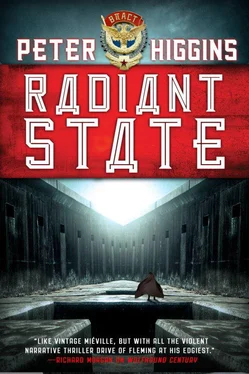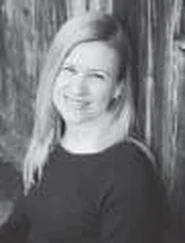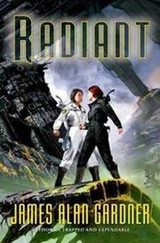Two jolting trucks bring up the rear. A sweating corps of journalists is tucked in among their movie cameras and their tape recorders. The men in the open backs of the trucks crook their arms in permanent angular shirt-sleeved salute, cramming homburgs, pork-pies, fedoras down tight on their heads against the hot wind of their passage. None but Rizhin knows what they are coming to see.
The party might have flown in to the cosmodrome in comfort but Rizhin refused to allow it, citing the presence among them of ambassadors from the new buffer states. We must never permit a foreigner to fly across the Vlast , he said. All foreigners are spies . That was the reason he gave, but his purpose was showmanship. He didn’t want his audience seeing the testing zones or getting any other clues. None among them, not even the most senior Presidium member, had any idea how far and how fast the project had progressed. And so they all rode for three days in a sweltering sealed train with perforated zinc shutters on the outside of the windows, and then in cars from the railhead, five hours across baking scrubland, to arrive red-faced and dishevelled at Test Site 61, where a cluster of temporary tin huts has been erected for the purpose of receiving them.
The temporary huts crouch in the shade of a two-hundred-foot tall, eighty-foot diameter, snub-nosed upright bullet of thick steel. The bullet is painted crimson with small fins near the base. The fins serve no functional purpose but Rizhin demands them for the look of the thing, to make it more like a rocket, which it is not.
The Vlast Universal Vessel Proof of Concept stands against its gantry, an ugly truncated stub, a blood-coloured thumb cocked at the sky, a splash of hot red glimmering in the glare of the sun.
Three time zones west of Chaiganur and eight hundred miles to the north, in the eastern outskirts of Mirgorod, a short train ride from the shore of Lake Dorogha, a woman in a shabby grey dress picks her way across a war-damaged wasteland.
Five years of reconstruction across the city have passed this place by, and the expanse of bomb craters and ruined buildings is much as she last saw it: tumbled brick-heaps, charred beams, twisted girders, tattered strips of wallpaper exposed to the sun. There are brambles now, nettles and fireweed and glossy grass clumps on slopes of mud, but otherwise nothing has changed. It is still recognisable.
The place she is looking for isn’t hard to find. She chose it well back then. It is a warehouse of solid blue brick, a bullet-scarred construction of blind walled arches and small glassless windows: roofless, but so it had been back then. During the siege this place had been contested territory: again and again the tanks of the Archipelago passed through and were driven back, and each time the warehouse survived. An artillery shell had taken a gouge from one corner, but the walls had stood. She’d used the upper windows herself for a week. It made a good place to shoot from when she was waging her private war, alongside the defenders of Mirgorod but not of them.
She crosses the open ground to the warehouse carefully, taking her time, moving expertly from cover to cover, using the protection of shell holes and bits of broken wall. There are no shooters to worry about now, only wasps and rats, nettles and thorns. Almost certainly there is no one here to see her at all, no faces in the overlooking windows, but it’s as well to take precautions. She mustn’t be noticed. Mustn’t be seen. The sound of the city is a distant hum. She is getting her dress dusty and mud-stained, but she has anticipated that. She carries a change of clothes in the canvas bag slung on her back. She is nearly forty years old, but she remembers how to do this. She was good at it then and she is good at it still.
Inside the warehouse the stairs to the cellars are as she remembers them. She has brought matches and a taper, but she doesn’t need them. She finds her way through the darkness, familiar as yesterday, by feel. Nothing has changed. It is possible that no one has been here at all since she left it for the last time on the day the war’s tide turned and the enemy withdrew.
She crouches at the far wall and runs clenched, ruined fingers along the low niche, touching brick dust and stone fragments and what feels like a couple of iron nails. For a moment she cannot find what she is looking for and her heart sinks. Then she touches it, further back than she remembered but still there. Her fingertips brush against an edge of dusty oilcloth.
Carefully she hooks the bundle out from the niche. It’s narrow and four feet long, bound with three buckled straps cut from an Archipelago officer’s backpack. The touch and heft of it–about twelve pounds weight in total, she estimates without thinking–brings memories. Erases the years between. She notices that her hands are trembling, and she pauses, takes a breath, centres herself and clears her mind. The trembling stops. She hasn’t forgotten the trick of that, then. Good.
In the blackness of the warehouse cellar, working by feel, she brushes the grit and dust from the oilcloth bundle and wraps it in the towel she stole before dawn that morning from a communal washroom. (The towel is a child’s, faded pink with a pattern of lemon-yellow tractors, the most innocuous and suspicion-disarming thing she could find. If she’s stopped and searched on the way back, it might just work. Camouflage and misdirection. Though she doesn’t expect to be searched: she’ll be just one more thin drab widow lugging a heavy bag. Such women are almost invisible in Mirgorod.)
She stows the towel-wrapped bundle in the canvas bag, hooks the bag on her shoulder and climbs back up towards the narrow slant of dust-filled sunlight and the morning city.
In a temporary hut at Chaiganur Test Site 61 the ministers of the Central Committee of the Presidium and the other dignitaries assemble to hear a briefing from Programme Director Professor Yakov Khyrbysk. The room is unbearably hot. Dry steppe air drifts in through propped-open windows. Khyrbysk’s team has mustered tinned peach juice and some rank perspiring slices of cheese.
President-Commander of the New Vlast General Osip Rizhin fidgets restlessly in the front row while Khyrbysk talks. He has heard before all that Khyrbysk has to say, so he is working through a pile of papers in his lap, scrawling comments across submissions with a fountain pen. Time moves on, time must be used. Big fat ticks and emphatic double side-linings. Approved. Not approved. Yes, but faster! Why so long? Do it now! Rizhin likes to draw wolves in the margins. I am watching you.
He listens with only half an ear as the Director runs through his spiel: how the experimental craft will drop atomic bombs behind itself at the rate of one a second and ride the shock waves upwards and out of the planetary gravity well. How the ship is not small, as space capsules are imagined to be, but built large and heavy to withstand the explosive forces and suppress acceleration to survivable levels.
‘Vlast Universal Vessel Proof of Concept weighs four thousand tons,’ he tells them, ‘and carries a fifteen-hundred-ton payload. She was designed and built by the engineers of the Bagadahn Submarine Yard.’
He tells them how the explosions generate temperatures hotter than the surface of the sun, but of such brief duration they do not harm the pusher plate. How Proof of Concept is equipped with two thousand bombs of varying power, and the mechanism for selecting the required unit and delivering it to the ejector is based on machinery from an aquavit-bottling factory. That gets a chuckle from the back of the room.
Читать дальше












